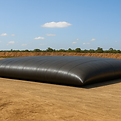
Practical Geosynthetic Solutions for High-Performance Containment
We provide technical guidance, premium material supply and on-site project support for waste, water, mining and environmental containment systems.
From geomembrane (liner) selection and design verification for high-risk containment, to the engineering and supply of geotextile dewatering container stacks, Kontain provides tailored solutions for every site managing waste. We supply premium Kontain geobags and offer site supervision and third-party testing where required. Our end-to-end support enhances reliability, durability and long-term performance across all containment applications.
Services

Geosynthetics Expertise
Independent advice on geomembranes, geotextiles, drainage layers and dewatering systems for containment.
Includes:
-
Material selection
-
Design input & constructability advice
-
Specification review
-
Risk & durability guidance

Premium Material Supply
Supply of high-performance geobags (geotextile dewatering containers).
Includes:
-
Advice on material grade & suitability
-
Sizing and configuration of geobags
-
Logistics & delivery management
-
Datasheets and technical pack

Project Support & Site Services
On-ground help to ensure installations are done correctly and safely.
Includes:
-
Site inspections
-
Installation supervision
-
Deployment advice
-
Coordination with contractors & CQA teams
-
Third-party testing facilitation
Why Choose Kontain?
-
Independent expertise without bias (despite supplying materials, our technical background proves independence).
-
Premium materials including Atarfil geomembranes and high-quality Kontain geotextile dewatering tubes/bags.
-
Practical, site-ready design support built on real engineering experience.
-
On-ground supervision to ensure installations are done correctly.
-
Access to advanced testing through ExcelPlas when durability assessments are needed.
-
Focused on long-term and/or safe containment performance for mining, water, waste and environmental projects.